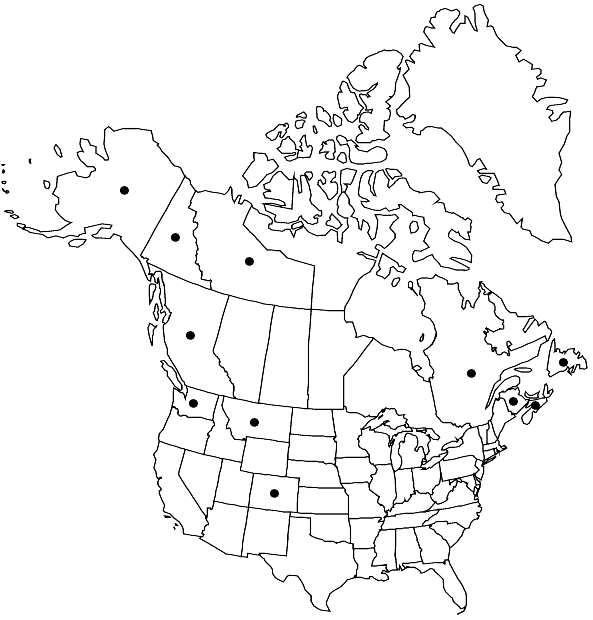Schistidium trichodon
Svensk Bot. Tidskr. 47: 253. 1953,.
Plants in open tufts or extensive mats, black, dark olivaceous, or brownish-olivaceous. Stems 1.8–12 cm, central strand weak or absent. Leaves usually somewhat curved, rarely secund, ovate-lanceolate, sharply keeled distally, 1.7–2.7 mm, 1-stratose; margins usually recurved throughout and denticulate distally, 1-stratose or 2-stratose; apices acute; costa percurrent or excurrent as a short, denticulate, weakly decurrent awn, abaxial surface usually weakly papillose; basal marginal cells quadrate or short-rectangular, sometimes trigonous; distal laminal cells mostly short-rectangular, 8–10 µm wide, usually trigonous, sinuose. Sexual condition autoicous. Capsule red-brown, cylindric to short-cylindric, rarely cupulate, 0.7–1.2 mm, sometimes ribbed when dry; columella persistent within capsule; exothecial cells mainly isodiametric, sometimes mixed with short-elongate cells, thin-walled, trigonous; stomata present; peristome erect or ascending, often twisted inwards and overlapping distally, forming a dome, 400–700 µm, red, finely papillose, rarely with a few narrow slits. Spores 9–13(–19) µm, granulose or nearly smooth.
Phenology: Capsules mature late spring to early summer.
Habitat: Usually on calcareous rock (collected once on acidic rock in Washington State), open to shaded habitats
Elevation: low to high elevations (0-3500 m)
Distribution

B.C., N.B., Nfld. and Labr. (Nfld.), N.W.T., N.S., Que., Yukon, Alaska, Colo., Mont., Wash., Eurasia.
Discussion
The habitat, almost always on calcareous rock, its black or dark olivaceous color, the lack of long awns, the long, often domed peristome, and the persistence of the columella within the capsule make Schistidium trichodon a distinctive species.
Selected References
None.